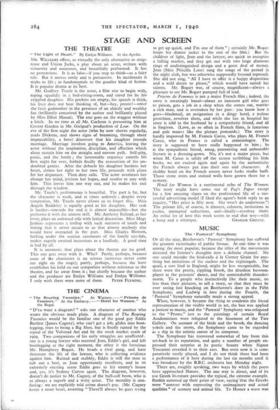STAGE AND SCREEN
THE THEATRE
I' The Light of Heart." By Emlyn Williams. At the Apollo. MR. WILLIAMS offers, as virtually the only alternative to strip- tease and Union Jacks, a play about an actor, written with virtuosity and assurance, and beautifully performed. It his no pretensions. It is as false—if you stop to think—as a fairy tale. But it moves easily and is persuasive. In incidentals it sticks to life ; in fundamentals to the gaudier kind of fiction. It is popular drama at its best.
Mr. Godfrey Tearle is the actor, a film star to begin with, toping squalidly in a bed-sitting-room, and cared for by his crippled daughter. His pockets are empty, his speech is thick, his liver does not bear thinking of, but—hey, presto ! —enter the fairy godmother in the presence of an elderly and wealthy fan (brilliantly conceived by the author and brilliantly played by Miss Elliot Mason). The star goes on the waggon without a hitch. In no time at all Mr. Cochran is presenting him at Covent Garden in Mr. Gielgud's production of Lear. On the eve of the first night the actor (who by now shaves regularly, reads Dickens, and shows signs of becoming, through sheer impeccability, a bore) discovers that his daughter intends marriage. Marriage involves going to America, leaving the actor without the inspiration, discipline, and affection which alone sustain him on the straight and narrow path. Self-pity, panic, and the bottle ; the lamentable sequence cancels his first night for ever, forbids finally the reassertion of his un- doubted genius. After the debacle his daughter hardens her heart, claims her right to her own life, proceeds with plans for her departure. Then duty calls. The actor overhears her change her mind, jettison her hopes, and resolve to stay with him. This leaves him one way out, and he makes his exit through the window.
Mr. Tearle's performance is beautiful. The part is fat, but the character is weak, and at times unlovely ; despite every temptation, Mr. Tearle never allows us to forget this. Miss Angela Baddeley is equally good as his daughter. Her task is harder—towards the end it is almost impossible—but she performs it with the utmost skill. Mr. Anthony Ireland, as her lover, plays an awkward role with lyrical discretion. Miss Megs Jenkins represents a trollop with such sureness of touch and timing that it never occurs to us that almost anybody else would have overacted in the part. Miss Gladys Henson, lurking under the saurian casements of the family eye-lids, makes eagerly awaited incursions as a landlady. A good time is had by all.
It is axiomatic that plays about the theatre are no good. This one gets away with it. Why? Partly, perhaps, because none of dee characters is an actress (actresses never come out right on the stage); partly, perhaps, because the hero establishes his hold on our sympathies without reference to the theatre, and far away from it ; but chiefly because the author and the producer are Emlyn Williams and Emlyn Williams.
I only wish there were more of them. PETER FLEMING.














































 Previous page
Previous page